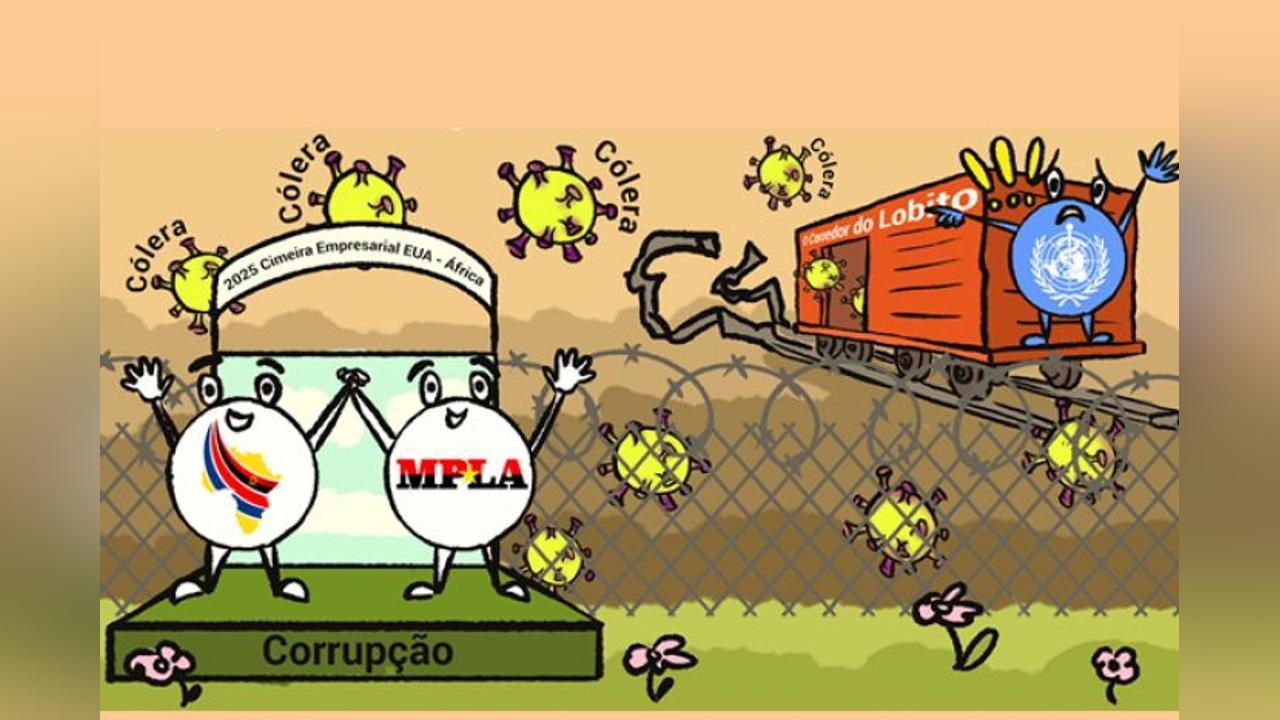Africa-Press – Angola. Angola is currently experiencing one of the biggest health crises in its history, a cholera epidemic that has already claimed the lives of thousands of Angolans. However, the Angolan government has other priorities, such as a large banquet organized for European businessmen, while Angolans go hungry or die of cholera.
Luanda will host a US-Africa Business Summit with more than 1,500 delegates and heads of state while Angola is experiencing one of the worst health crises in its history, which has already claimed the lives of thousands of Angolan citizens. The summit is expected to feature the best of Angolan cuisine, a country where some of its citizens are suffering from hunger. Entertainers and girls are also expected to keep European businessmen company. As we know, these summits generally do not solve Angola’s most pressing problems, nor do they provide solutions to the cholera crisis that even the WHO has proposed solving.
Recently, speaking out against the cholera crisis affecting Angola, UNITA MP Anabela Sapalalo wrote on her Facebook profile that workers from the Democratic Republic of Congo, Zambia and other parts of the continent often work in illegal conditions, without any kind of labor protection or health monitoring. They are not only victims of exploitation, but also potential involuntary vectors of epidemic outbreaks. The question is, where did these Congolese workers sign their employment contracts, if they actually work under one? An article from the DRC Ministry of Health confirms that the neighboring country is also suffering from cases of cholera.
For UNITA MP Edgar Kapapelo, economic development is important and necessary, but it cannot, at any time, be dissociated from the protection of public health and human dignity. “The warning from the World Health Organization (WHO) about the risk of spreading infectious diseases, including cholera, cannot be ignored,” says the MP.
An important report by the World Health Organization (WHO) confirms that the accelerated development of the Lobito Corridor is generating direct negative impacts on public health, including the spread of infectious diseases such as cholera, often introduced or aggravated by the uncontrolled flow of migrant workers.
According to Novo Jornal, in 2024, Health Minister Sílvia Lutucuta acknowledged that migration between the DRC, Angola and Zambia is contributing to the increase in the number of cholera cases. The intense mobility of people increases the risk of cholera spreading even further. Concern about the crisis led MINSA to issue several announcements to prevent a cholera crisis.
The crisis is so serious that the World Health Organization is supporting Angola in combating the cholera outbreak that has hit most of the Portuguese-speaking African country. At least 600 people have died. The death rate is 3.2%, which exceeds the 1% threshold used as an indicator for early and appropriate treatment of patients with the infection.
The report released by the WHO states that five main dangers accompany the growth of the corridor: overburdened health infrastructure, disease transmission, environmental degradation, social displacement and increased transport-related injuries. There is also a sixth: the unequal distribution of benefits. While foreign investors and national elites reap the profits, local communities bear the brunt of pollution, land expropriation and labor exploitation.
One of the companies operating the Corridor is Trafigura, which according to PublicEye and the G1 portal has been involved in international corruption scandals and attempted bribery of authorities in different countries. The US Department of Justice ordered Trafigura to pay US$127 million, but offset US$27 million from a pending lawsuit in Brazil. When Brazil accused Trafigura of bribery in December 2020, the company still denied the accusation, even with evidence of active corruption found by the Brazilian Federal Police within the scope of Operation Lava Jato.
France24 reports that Trafigura has been convicted in a Swiss court for corruption in Angola – the group, particularly active in the oil trade, was fined 3 million Swiss francs ($3.2 million) for failing to properly monitor the activities of its intermediaries, the federal court reported on Friday. The situation was so serious that Michael Wainwright, Trafigura’s former chief operating officer, was sentenced to 32 months in prison, of which 12 months were to be served. Prison sentences were also imposed on an individual who acted as an intermediary in the payment of bribes and on a former agent of an Angolan state company.
Despite Trafigura’s poor reputation, a company that has had operational directors sentenced to prison terms, the company operates without any obstacles in Angola. It is as if government authorities are complicit in the fact that Angola’s main engineering project is being run by a company known worldwide for its corruption scandals. This company does not provide the minimum infrastructure in Angola necessary to ensure that families are not affected by the works around the Lobito Corridor, nor health clinics and hospitals for workers who work under appalling conditions.
With over US$1.6 billion in investment from the United States and the European Union, the region around the Lobito Corridor needs to have the maximum necessary healthcare infrastructure. Why aren’t the Western companies that are members of the LAR consortium concerned about this? This question is all the more relevant in the run-up to the US-Africa Business Summit, which starts on June 22. Indeed, why haven’t companies like Mota-Engil and Trafigura built hospitals and developed healthcare infrastructure? Are these companies run by colonialists?! Trafigura, Mota-Engil and Vecturis knew about the consequences of the Lobito Corridor, but did nothing, demonstrating that they do not care about the lives and health of Africans, but rather about the resources that profits will bring them.
angola24
For More News And Analysis About Angola Follow Africa-Press






